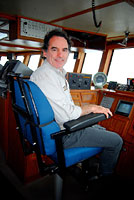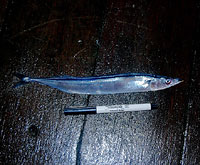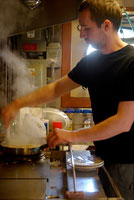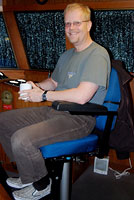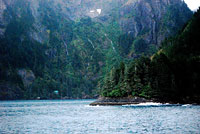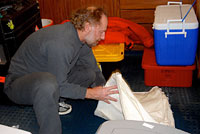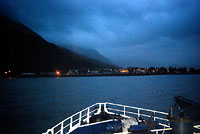

 | |||||||||||||||||||||||
|
|
Journals 2008/2009Karen Rudio
September 18, 2008 Today is our last sampling day. The stations are MS 1-4 and HB 1-4, all within Prince William Sound. The weather is significantly colder and rougher. In fact, it was too rough for Brad to do his bird survey this morning. It will be even worse when we enter open water and return to Seward this evening. We'll sleep aboard Tiglax tonight, but we'll be busy packing up the gear and samples. We must be off the ship by 9:00 am tomorrow morning as the ship has a 16-hour run to its home port of Homer. In the past, the crew has hidden Russ's chair to get him to stop working under the microscope. The crew is really looking forward to their first weekend off in a long time. Normally, Russ's spring cruise in early May is the first of the season and his September cruise is the last of the season. In between, the crew is mostly at sea in the Aleutians supporting four wildlife monitoring stations plus dropping off and picking up scientists and their equipment at several campsites with research projects. The Captain informed me that at a typical site scientists were dropped off on May 25th and not resupplied. They were picked up again on Aug. 26th. This year the season has been extended because of a rat extermination project on one of the islands. So, Monday morning the crew will prepare for another expedition.
Living and working on a ship at sea is challenging even after you get your sea legs. There are always surprise waves that push you off balance and into walls, equipment and people. I haven't had this many bruises since I was a child learning to roller skate. Another aspect of working here is that you can count on getting wet. Waves often splash over the railing. In fact, one wave dropped a small fish called a Pacific Saurie onto the deck. Another time, I was busy collecting water samples and didn't see a large wave coming. Poor David Leech thought there was a man-over-board when I let out a scream as very cold water filled up my boot! If the waves don't get you, the rain will. It has rained every day but one, but that is common for this time of year in the Gulf of Alaska.
The Tiglax boasts an excellent cook, Reuben Guetschow. He made four different kinds of pizza for dinner last night with a great Caesar salad. We have fresh bread and homemade soup every day at lunch. We've also had fresh coffee cake, chocolate chip cookies and brownies. Reuben says that it's a challenge to live at sea. There are rough seas, cramped quarters, time away from friends and family, but it's a great job if it fits your personality. It pays well and you are unable to spend the money at sea. It will be very disappointing going home to my own cooking.
The Captain and deck hand John Faris work an eight-hour shift from 6:00 am to 2:00 pm. They have four hours off from 2:00 pm to 6:00 pm and then they work four more hours from 6:00 pm to 10:00 pm. The first mate Dan Erickson and deck hand Andy Velsko work the opposite shift. The cook and the engineer work the day shift, but the engineer is always on call. The Captain and the engineer are employed full time, but the rest of the crew has seasonal contracts. During downtime the crew reads, watches movies, does laundry, exercises or catches up on their sleep. The ship does not receive TV or radio stations, but it does have an exercise bike and an elliptical machine. Several members of the crew are learning to play musical instruments. Dan and Reuben are learning guitar and the Captain plays harmonica. The weather was so nice yesterday that Reuben and Allison were able to practice some yoga on the bird deck.
Today was a pretty routine sampling day until this afternoon when we met up with four Humpback Whales! The Captain slowed the ship down and spread the word so we all got a chance to see them. They were impressive, shooting water high above the ocean's surface. I grabbed the video camera and hopefully got some good shots. I also got some good footage of the ship's passage through Resurrection Bay to Seward. There were beautiful green cliffs on both sides with waterfalls meeting the sea. Several of us stayed on the bridge to watch the show. The passage was so narrow in places that the Captain had to turn off the auto-pilot and maneuver the ship by hand. At one point we passed a huge cruise ship. Some people pay a lot of money for the experiences I have had this week.
I am very thankful to have had this opportunity. The Captain, crew and scientists were very helpful and patient in answering my numerous questions. They not only allowed me to photograph them, but on several occasions they spoke directly to my students through the video camera. I loved the beautiful scenery, the whales, otters and sea birds. This was an unforgettable experience living at sea and participating in oceanographic research.
|
||||||||||||||||||||||
